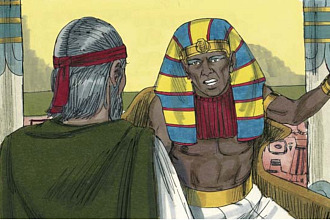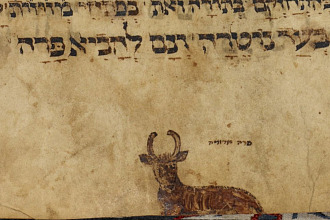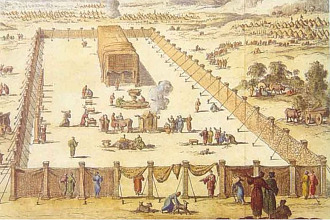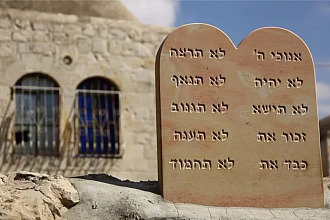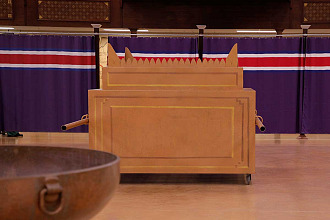Parasha for the Week: Pinchas Numbers 25:10 - 30:1
Haftarah for the Week: 1 Kings 18:46 - 19:21
Besorat Yeshua: Mark 6:2-13
Overview
G-d tells Moshe to inform Pinchas that he will receive G-d’s “covenant of peace” as reward for his bold action - executing Zimri and the Midianite princess Kozbi.
G-d commands Moshe to maintain a state of enmity with the Midianites who lured God’s people into sin.
Moshe and Elazar are told to count the People of Israel.
The Torah lists the names of the families in each tribe.
The total number of males eligible to serve in the army is 601,730.
G-d instructs Moshe how to allot the Land of Israel to Bnei Yisrael.
The number of the Levites’ families is recorded.
Tzlofchad’s daughters file a claim with Moshe: In the absence of a brother, they request their late father’s portion in the Land.
Moshe asks G-d for the ruling, and G-d tells Moshe that their claim is just.
The Torah teaches the laws and priorities which determine the order of inheritance.
G-d tells Moshe that he will ascend a mountain and view the Land that Israel will soon enter, although Moshe himself will not enter.
Moshe asks G-d to designate the subsequent leader, and G-d selects Yehoshua bin Nun.
Moshe ordains Yehoshua as his successor in the presence of the entire nation.
The Parasha concludes with special teachings of the service in the Beit Hamikdash.
"True Honor"
The Torah states: “the Lord spoke to Moshe saying, ‘Pinchas the son of Eliezer, the son of Aharon the priest, has turned away my anger from the Children of Israel in that he was jealous for my sake amongst them, so that I did not consume the Children of Israel in my jealousy.’ “ (Numbers 25:10-11)
Rabbi Chaim Shmuelevitz, the former Rosh HaYeshiva (head of the yeshiva) Mir, said that only someone who is a true lover of Israel, such as Aharon who loved peace and pursued it, can react with such zealousness. Rabbi Zelig Pliskin said that Zimri committed an immoral act with a Midianite in public and without any shame. In response, Pinchas killed them both. Pinchas’ reaction might appear cruel and could have conceivably have been motivated by a tendency towards violence or by a personal hatred. If one is a true lover of God’s people (as was Pinchas), however, we can be sure that he is motivated solely by his great love for the Almighty and his people.
“A Wise Leader”
The story is told of ten Hungarian rabbis who had been summoned to the royal palace to discuss issues involving Jewish community matters. The ten rabbis came from different parts of the country and some of them had not seen each other before. Before the formal meeting with the ministers, they decided to appoint one rabbi as their formal spokesman. All of the rabbis were prominent figures and great Torah scholars. At the same time, they were very humble so each one tried to appoint someone else for this task. One of the rabbis was Rabbi Yehuda Assad, a noted Torah scholar and author of important Torah writings. Pointing to a rabbi along the side of the room, he said, “I nominate the one whom I’m seeing now for the first time. I don’t know him; but from what I can see of his face, he seems to be very wise. With such a respectable, distinguished, and G-d fearing appearance, I’m sure he will make a very favorable impression on the ministers.” The rabbis turned to the figure to which he was pointing to and were surprised and amused. The walls of the room were completely covered with mirrors, and Rabbi Yehuda had been pointing to the one figure he had never seen before... himself!
Rabbi Yehuda Assad never looked into a mirror before. He had no idea that he was viewing his own reflection. Unknowingly, while thinking it was someone else, he had suggested himself to speak for everyone. “Agreed! We all agree,” responded the other rabbis. Rabbi Yehuda Assad couldn’t refuse and he successfully led the group.
"Quality of a Good Leader"
Because Joshua was Moses’ most devoted follower, he was chosen to succeed him. Joshua made himself completely subservient to Moses, never departing from his tent.
Joshua showed that he understood that a Jewish leader does not act instead of the people, but rather provides a model to follow. Because he understood this more clearly than any of his contemporaries, he was chosen to succeed Moses.
HAFTARAH: 1 Kings 18:46 - 19:21
Parasha: Pinchas is opposed to the sinners who have been with the daughters of Moab and the Midianites.
Haftarah: This haftara is the story of Elijah challenging the prophets of Baal on Mount Carmel.
Parasha: After challenging the sinners Pinchas kills Zimri and the adulterous woman who challenged the Lord.
Haftara: After challenging the priests of Baal, Elijah kills the priests and prophets of Baal who challenged the L-rd.
Parasha: In the Parasha we have the choosing of a good leader. Yehoshua bin Nun
Haftara: In the Haftara we see a good leader chosen by G-d, Elijah, in action.
Parasha: G-d gives some laws about sacrifices.
Haftara: Elijah re-established the true sacrifices to the Lord.
BESORAT YESHUA Mark 6:2-13
One of the topics of the Parasha and Haftara is the question of leadership. How to choose a good leader, and the qualities of a good leader.
Parasha: Yehoshua is chosen by God to succeed Moshe. “So the LORD said to Moses, “Take Yehoshua son of Nun, a man in whom is the spirit, and lay your hand on him.” (Numbers 27:18).
Besora: Yehoshua is one form of the Hebrew name of Yeshua.
Parasha: Yehoshua Bin Nun is a leader full of Ruach Elohim, (Spirit of God)
Besora: Yeshua is a special leader. No leader ever taught like him. When the Sabbath came, he began to teach in the synagogue, and many who heard him were amazed. “Where did this man get these things?” they asked. “What’s this wisdom that has been given him, that he even does miracles! (Mark 6:2).
Parasha: G-d gives an order to make a census of Israel and at the same time the text gives us a simple genealogy. “The descendants of Reuben, the firstborn son of Israel, were: through Hanoch, the Hanochite clan; through Pallu, the Palluite clan…” (Numbers 26:5).
Besora: Very Interestingly the Besora of Mark give a small genealogy of Yeshua in this very passage “Isn’t this the carpenter? Isn’t this Mary’s son and the brother of James, Joseph, Judas and Simon? (Mark 6:3).
Parasha: We are always facing Israel’s the lack of faith of all the miracles that Moshe performed in the name of the L-rd.
Besora: This text of the Besora gives us a mixed feeling, The crowd of the Jews are amazed about this new leader and at the same time, Yeshua is astonished about the lack of faith of some others. (Mark 6:6).









